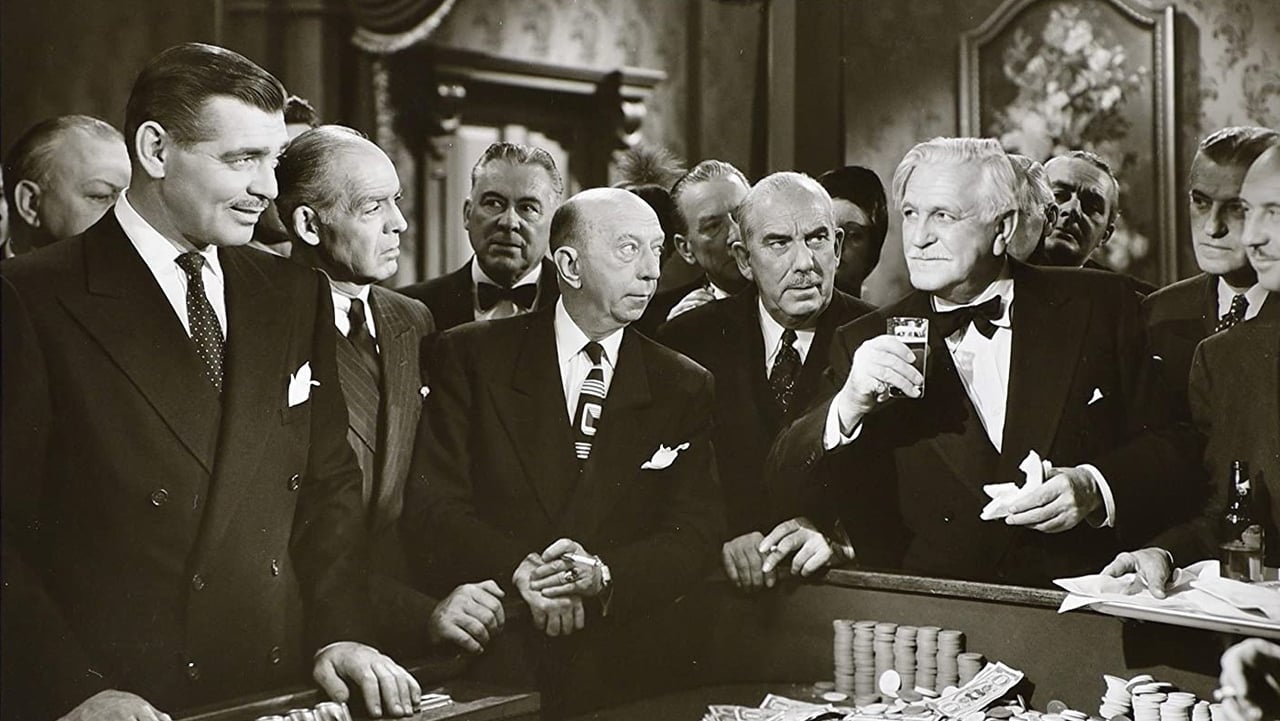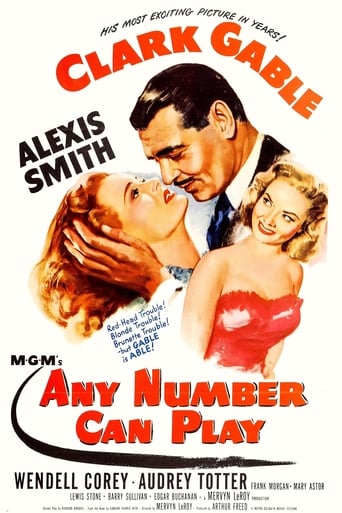



the audience applauded
hyped garbage
Brilliant and touching
The story, direction, characters, and writing/dialogue is akin to taking a tranquilizer shot to the neck, but everything else was so well done.
View MoreClark Gable is a casino owner who has tried to give all he can to his wife and son, but maybe all they needed was his time. Alexis Smith and Dwayne Hickman is his wife and son, and the movie is peppered with great supporting actors like Frank Morgan, Wendell Corey, Mary Astor and Marjorie Rambeau. The film begins rather slow, but is rewarding to those who like character studies and get into family dynamics. This seems to be the type of film that doesn't rely so much on active plot but on the way the characters relate to each other, which in some ways, puts it ahead of its time. While others may find fault with the film and I do admit it has its faults, I thoroughly enjoyed it and appreciated what it was trying to convey, that in life we have to give a second chance not only to others but also to ourselves. A new beginning is always the best perspective. Watch Any Number Can Play and see what you get out of it.
View MoreBelieve it or not, Any Number Can Play was one of the few non-musicals produced by Arthur Freed over at MGM. To show you it was a Freed film, please note that the background music includes such Freed tunes as This Heart of Mine and Should I.Richard Brooks who would soon get a big directing break in another Freed produced non-musical, Crisis, wrote a very fine story that Mervyn LeRoy directed with class and finesse. LeRoy got a stellar cast together and really mixed the ingredients well.Clark Gable is perfect as an aging gambler with a lot on his plate. He's just been told by Dr. Leon Ames that he's got angina pectoris and for the sake of his health he'd better give up a very high stress profession. He's got a loving wife in Alexis Smith and a rebellious teenage son in Darryl Hickman who he barely knows. Living with them is her sister Audrey Totter and her husband Wendell Corey. Gable employs Corey at his gambling establishment where Corey does a little chiseling on the side and he's also into racketeers Richard Rober and William Conrad for some big bucks. They've got ideas how to cancel the debt. And Totter measures her own husband against Gable and finds Corey quite wanting.That's just in his own household. Gable's got a lot of friends and enemies playing at his high class establishment which the police all know about, but do nothing because half the town's establishment is in the place on a given night. Such habitués might include Frank Morgan, Marjorie Rambeau, and Mary Astor a divorcée also carrying a huge torch for MGM's king.The story involves all these issues and how they're resolved over one 36 hour period. What makes Any Number Can Play such a good film is that even the smallest characters do have their moments. Art Baker plays the owner of a country club where Hickman gets in a fight over his father. Note how in his brief moments, Baker tries oh so hard to keep Gable out of it when he discovers who Hickman is. Astor has only one real scene, but it's a beauty involving Gable having an angina attack and then with minimal dialog the two of them talking about a lost love of many years ago. Staged brilliantly, I might add.One thing about Any Number Can Play that is frighteningly real are those angina attacks, remembering just how Gable died as the result of doing some very high stress stunt work on The Misfits. Absolutely eerie.Any Number Can Play is one of Gable's best post World War II films and not to be missed by any of his fans. And if you're not a Clark Gable fan, you might become one after seeing this.
View MoreThis postwar movie was one of Clark Gable's last for the studio that made him a star--MGM. Gable is older, perhaps wiser, but here fully capable of playing this role with all of the insight into life that his 49 years have earned him. One has the feeling that after the great '30s roles such as Rhett Butler, after the death of Carole Lombard, and after the war, Gable was perfect for the world-weary professional gambler that he plays here--the part fits him like a glove. And he's surrounded by great character actors such as Frank Morgan, Lewis Stone, and Mary Astor, to name a few. I don't agree with the other review that said this was a totally unrealistic, if watchable film: I grew up in a small city that had a gambling house similar to the one depicted here. It was well run, had many regulars, and was quite well known to the authorities. In any case, this movie is well worth a view, if you're not a Gable fan, you might be after viewing this one.
View MoreA much underrated film from the late forties, it features a middle-aged Clark Gable as the owner of a gambling house, where he plays host to a variety of colorful characters. The plot is fairly foolish but at least two of the actors, Barry Sullivan and Wendell Corey, are quite good, and cast somewhat against type.Mervyn LeRoy directed, and either he or the studio bosses decided that the characters would scarcely venture out of doors for the entire run of the picture. As a result we get to explore the casino, Gable's office and home, a restaurant, a hallway, and a few other places, most of them nicely paneled and well appointed, with no sense of urgency regarding action, as we know that the next scene will also be indoors, perhaps upstairs this time, where we will have an opportunity to observe a lamp or a fine mahogany desk. LeRoy moves his people around nicely, and wisely emphasizes the film's geographical limitations (agoraphobic? agoraphilic more likely)--one might even say he revels in them.There's no sense of reality to the story, which is never the least bit convincing. Yet it has a kind of authority, due largely to the admirable professionalism of the people responsible for giving the film its look. One never mistakes such Hollywood stalwarts as Frank Morgan, Marjorie Reambeau or Lewis Stone for real people. William Conrad, in a small role as a hold-up man, does not seem the least bit menacing. I found myself smiling when he turned up. Good old Cannon.Yet for all its faults the movie has going for it something that many a larger budgeted and more realistic film doesn't have: it is watchable. One likes the people in it. There's a confidence in the way it's done; and a fine sheen to the finished product. While it fails at drama and psychology, it succeeds in being an extremely well-crafted piece of work.
View More